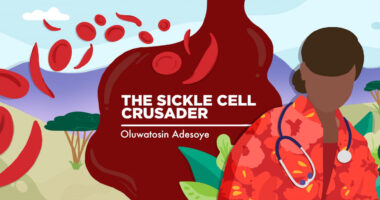We Need More Awareness of Aplastic Crises

When a sickle cell patient mentions a crisis, most people think of a painful, vaso-occlusive crisis. I can understand why — it’s by far one of the most common complications of sickle cell disease. However, it’s not the only complication that can occur.
One day when I was about 6, I woke up feeling very unwell. Though I was young, I was aware that I suffered from sickle cell, and I knew how to identify crisis pain. However, on that particular morning, I felt unwell but wasn’t in pain. I was very weak and lethargic, which made it difficult for me to mobilize. I didn’t have the energy required to stand up and walk around.
My parents tried to take me to our general practitioner, but it was hopeless given how weak I was. So, they called the GP and requested a home visit. I don’t know what else happened that day. My next memory is waking on my sofa with the GP there. He spoke to my parents briefly, and by that evening, I was hospitalized. I was so confused because I wasn’t in pain. Why was I there?
I learned that I was experiencing something called an aplastic crisis. An aplastic crisis occurs when the bone marrow suddenly stops producing red blood cells, causing the body’s hemoglobin levels to plummet, which in turn leads to anemia and severe lethargy.
That was my first aplastic crisis.
The week leading up to my recent birthday was quite hellish for me. I felt extremely weak. I had taken the week off from work, but unfortunately, given how poorly I was feeling, I had to cancel all my plans.
After about two days of doing nothing, I was hospitalized. I worried that I was experiencing my second aplastic crisis.
At the hospital, my bloodwork revealed that I wasn’t. But for some reason, my hemoglobin had dropped considerably, which is why I felt the way that I did. To combat this, I was advised to rest, undergo oxygen therapy at home for three nights, and amend my transfusion schedule to receive one earlier than planned. Thankfully, all of this worked. I started feeling a bit more like myself and still managed to enjoy my birthday.
After talking with others who are affected by sickle cell, I’ve noticed that knowledge of aplastic crises is limited. I wanted to share this experience to inform others that aplastic crises are real, and to let sickle cell patients know that if you start feeling abnormally weak, you should seek medical intervention immediately. It’s possible that your body has suddenly stopped producing red blood cells.
Aplastic crisis usually occurs in childhood, but adults may experience it, too. This is also the case with other sickle cell symptoms, such as stroke and an enlarged spleen.
Usually, an aplastic crisis is treated with a blood transfusion, and the bone marrow recovers on its own and starts producing red blood cells again. Once hemoglobin returns to normal levels, the patient will likely feel better.
Have you experienced an aplastic crisis? Please share in the comments below. Perhaps we can raise awareness of this complication together so that people are adequately informed.
***
Note: Sickle Cell Disease News is strictly a news and information website about the disease. It does not provide medical advice, diagnosis, or treatment. This content is not intended to be a substitute for professional medical advice, diagnosis, or treatment. Always seek the advice of your physician or other qualified health provider with any questions you may have regarding a medical condition. Never disregard professional medical advice or delay in seeking it because of something you have read on this website. The opinions expressed in this column are not those of Sickle Cell Disease News or its parent company, Bionews, and are intended to spark discussion about issues pertaining to sickle cell disease.








Michael Robinson
My sister and I experienced something similar in childhood. It started with my sister. She was weak and had a high fever. My mother, who got scared if we sneezed, rushed her to the hospital. She was there for a week. Normally I was always the one in the hospital due to pain crises, so this was abnormal. And me, trying to be a good brother, went everyday after school to visit. The day she was discharged, I went in that night for the exact same thing. We were told it was called an aplastic crisis and that now due to me being hospitalized, it was apparently contagious to other Sicklers. I was there for a week myself and haven't experienced it again thankfully.
Mary Shaniqua
Thank you for sharing your experience, I did not know that aplastic crisis was contagious - was this due to an infection also?
Joshua Ampofo Yentumi
Wow. I didn't know this. Thank you very much, I've learnt something today. I've had experiences like that but I've always attributed them to probably doing something stressful although at times I can't really remember what I did to be so weak. I haven't been hospitalized due to that, I usually rest for longer periods and I'm fine. Thanks for pointing this out once again. Will be more vigilant next time.
Mary Shaniqua
No problem Josh, we are all constantly learning on this journey. Glad I could be helpful :-)
Michele Roberts
I suffered these same symptoms some time ago in 1993. I did not know what was happening. Besides a crisis in my lower back my hemoglobin plummeted to 2 and my husband had to come to the hospital at 4 am. I was transfused and began to come around after while. There was much going on at the time so that i am not sure if it was the same thing. But, I was not aware of what was going on around me.
Mary Shaniqua
Wow I am so sorry to hear you experienced that Michele. a haemoglobin count of 2 sounds indeed sounds like aplastic crisis. I am happy to hear you got through it. Wishing you all the best